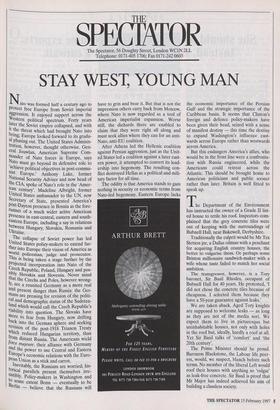The Spectator, 56 Doughty Street, London WC1N 2LL Telephone: 0171-405
1706; Fax 0171-242 0603
STAY WEST, YOUNG MAN
Nato was formed half a century ago to protect free Europe from Soviet imperial aggression. It enjoyed support across the Western political spectrum. Forty years later the Soviet empire collapsed, and with it the threat which had brought Nato into beta- 6, Europe looked forward to its gradu- al phasing out. The United States Adminis- tration, however, thought otherwise. Gen- eral Jouwlan, American Supreme Com- mander of Nato forces in Europe, says Nato must go beyond its defensive role to achieve political objectives in post-commu- nist Europe.' Anthony Lake, former National Security Adviser and now head of the CIA, spoke of Nato's role in the 'Amer- ican century'. Madeline Albright, former United States ambassador to the UN, now Secretary of State, presented America's post-Dayton presence in Bosnia as the fore- runner of a much wider active American presence in east-central, eastern and south- eastern Europe, including a say in relations between Hungary, Slovakia, Romania and Ukraine.
The collapse of Soviet power has led United States policy-makers to extend fur- ther into Europe their vision of America as world policeman, judge and prosecutor. This is being taken a stage further by the projected incorporation into Nato of the Czech Republic, Poland, Hungary and pos- sibly Slovakia and Slovenia. Never mind that the Czechs and Poles, however wrong- ly, see a reunited Germany as a more real and present danger than Russia: the Ger- mans are pressing for revision of the politi- cal and demographic status of the Sudeten- land which would call the Czech Republic's viability into question. The Slovaks have more to fear from Hungary, now drifting back into the German sphere and seeking revision of the post-1918 Trianon Treaty Which reduced Hungarian territory, than from distant Russia. The Americans wield force majeure: their alliance with Germany and the power to use Central and Eastern Europe's economic relations with the Euro- pean Union as a stick and carrot. Inevitably, the Russians are worried; his- torical parallels present themselves irre- sistibly. Policy-makers in Washington and to some extent Bonn — eventually to be Berlin — believe that the Russians will have to grin and bear it. But that is not the impression others carry back from Moscow, where Nato is now regarded as a tool of American imperialist expansion. Worse still, the diehards there are enabled to claim that they were right all along and must seek allies where they can for an anti- Nato, anti-EU coalition.
After Athens led the Hellenic coalition against Persian aggression, just as the Unit- ed States led a coalition against a later east- ern power, it attempted to convert its lead- ership into hegemony. The resulting con- flict destroyed Hellas as a political and mili- tary factor for all time. The oddity is that America stands to gain nothing in security or economic terms from Nato-led hegemony. Eastern Europe lacks the economic importance of the Persian Gulf and the strategic importance of the Caribbean basin. It seems that Clinton's foreign and defence policy-makers have been given their head, seized with a sense of manifest destiny — this time the destiny to expand Washington's influence east- wards across Europe rather than westwards across America.
But this endangers America's allies, who would be in the front line were a confronta- tion with Russia engineered, while the Americans could retreat across the Atlantic. This should be brought home to American politicians and public sooner rather than later. Britain is well fitted to speak up.
The Department of the Environment has instructed the owner of a Grade II list- ed house to retile his roof. Inspectors com- plained that the grey concrete tiles were out of keeping with the surroundings of Bubnell Hall, near Bakewell, Derbyshire.
Traditionally the culprit would be Mr Tex Stetson jnr, a Dallas oilman with a penchant for acquiring English country houses, the better to vulgarise them. Or perhaps some Brixton millionaire sandwich-maker with a wife whose taste failed to match her social ambition.
The transgressor, however, is a Tory baronet, Sir Basil Rhodes, occupant of Bubnell Hall for 40 years. He protested, 'I did not chose the concrete tiles because of cheapness. I selected them because they have a 50-year guarantee against leaks.'
We are taken aback. Aged Tory knights are supposed to welcome leaks — as long as they are not of the media sort, We expect them to live in picturesque but uninhabitable houses, not only with holes in the roof but, ideally, hardly a roof at all. Yet Sir Basil talks of 'comfort' and 'the 20th century'.
The Prime Minister should be proud. Baroness Blackstone, the Labour life peer- ess, would, we suspect, blanch before such terms. No member of the liberal Left would roof their houses with anything so 'vulgar' as leak-free concrete. Sir Basil is proof that Mr Major has indeed achieved his aim of building a classless society.


























































 Previous page
Previous page